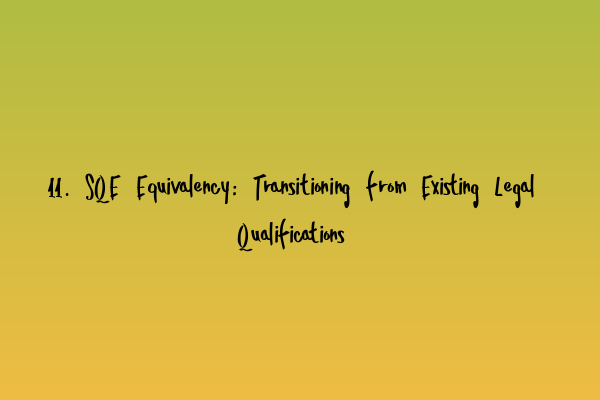SQE Equivalency: Transitioning from Existing Legal Qualifications
As the Solicitors Qualifying Exam (SQE) becomes the standard assessment for individuals seeking to qualify as solicitors in England and Wales, those with existing legal qualifications may wonder how their previous qualifications will be recognized and if they can transition seamlessly into the new framework. In this article, we will explore the SQE equivalency process and provide guidance for those looking to leverage their existing qualifications.
Understanding SQE Equivalency
The SQE, introduced by the Solicitors Regulation Authority (SRA), is designed to ensure consistent standards of competence for solicitors in England and Wales. It replaces the traditional route to qualification, which consisted of the Legal Practice Course (LPC) and the Professional Skills Course (PSC).
For individuals who have already obtained legal qualifications, such as a law degree or certain postgraduate diplomas, the SRA has established an equivalency framework. This framework allows individuals to demonstrate that their existing qualifications align with the knowledge and skills assessed by the SQE.
Criteria for Equivalency
In order to establish equivalency, candidates must submit evidence to demonstrate their competence in the required areas of study. This evidence may include transcripts, syllabi, and other supporting documentation. The SRA will then review the evidence and determine whether the candidate’s qualifications align with the required standards.
It is important to note that the SRA does not provide a definitive list of equivalent qualifications, as the assessment is based on the content and level of the qualifications rather than the specific title. This means that individuals with non-traditional legal qualifications, such as foreign qualifications or qualifications from non-law disciplines, may also be eligible for equivalency.
Maximizing Equivalence Potential
If you are considering applying for SQE equivalency, there are several strategies you can employ to maximize your chances of success:
- Research: Familiarize yourself with the content and structure of the SQE. This will help you identify the areas in which your existing qualifications may align with the required knowledge and skills.
- Evidence Compilation: Gather all relevant documentation, including transcripts, syllabi, and any other evidence that showcases your competence in the relevant areas of study.
- Personal Statement: Craft a compelling personal statement that highlights the connection between your existing qualifications and the knowledge and skills assessed by the SQE. This will help the SRA understand the rationale behind your application.
- Supporting References: Obtain references from professionals who can vouch for your competence in the required areas. These references should highlight your practical experience and ability to apply legal knowledge in real-life scenarios. (For more information, check out our article on SQE Case Studies: Applying Knowledge in Real-Life Scenarios).
- Time Management: Develop effective time management strategies to ensure you submit your application within the specified timelines. (For tips on time management, see our article on Mastering Time Management in SQE: Strategies for Efficient Exam Completion).
- Mock Exams: Consider taking mock exams to assess your preparedness for the SQE and identify areas where you may need further improvement. (To learn how to analyze mock results effectively, read our article on Analyzing Mock Results for SQE: Identifying Areas of Improvement).
- MCQ Preparation: Familiarize yourself with the multiple-choice question format, which is a significant component of SQE1. (For strategies to conquer MCQs, refer to our article on Conquer the Multiple Choice Questions (MCQ) in SQE1).
- Revision Techniques: Develop effective revision techniques to ensure you retain and apply the knowledge required for the SQE. (For tips on mastering revision, read our article on Mastering Effective Revision Techniques for SQE Success).
By employing these strategies and leveraging the resources available, you can increase your chances of successfully transitioning into the SQE framework.
Conclusion
The SQE equivalency process offers individuals with existing legal qualifications the opportunity to demonstrate their competence and align their qualifications with the new standards set by the SRA. By thoroughly researching the requirements, compiling strong evidence, and utilizing effective support strategies, aspiring solicitors can make a successful transition into the SQE framework.
At SQE Exam Law, we are dedicated to supporting candidates throughout their SQE journey. For more information on preparing for the SQE, check out our wide range of articles and resources designed to help you succeed.
